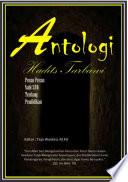Indonesia telah merdeka lebih dari 70 tahun tetapi kualitas pendidikan, sumber daya manusia, dan penelitian di Indonesia masih harus terus dikembangkan karena masih belum dapat mendukung perkembangan bangsa secara optimal. Hal ini antara lain disebabkan karena kualitas pelaksanaan dan hasil pendidikan dari berbagai jenjang dan jenis pendidikan belum semuanya didasarkan pada kebijakan yang dari hasil penelitian yang memadai. Dalam rangka meningkatkan kualitas pendidikan pada tingkat yang lebih tinggi, maka setiap upaya peningkatan kualitas harus dilakukan melalui sebuah metode penelitian yang ilmiah. Hal tersebut dilakukan untuk menghasilkan informasi yang akurat dan aktual dengan menggunakan metode penelitian yang tepat. Metode penelitian secara umum terbagi menjadi tiga jenis yaitu metode kuantitatif, metode kualitatif, dan metode penelitian. Buku ini berisikan definisi konseptual ilmu pengetahuan, filsafat ilmu pengetahuan, fungsi dan kedudukan agama, filsafat, dan ilmu, teori kebenaran dan logika, pedoman dalam membuat sebuah kepustakaan, pengertian sebuah penelitian, berbagai jenis desain penelitian, tahapan dalam membuat suatu penelitian, bahkan komponen-komponen sebuah penelitian seperti proposal penelitian, etika penelitian, instrumen penelitian, sampai analisis data baik kuantitatif maupun kualitatif. Buku ini diharapkan dapat membantu para akademisi, mahasiswa tingkat akhir, dan masyarakat umum yang ingin mempelajari tentang metode atau metodologi penelitian.
Indonesia telah merdeka lebih dari 70 tahun tetapi kualitas pendidikan, sumber daya manusia, dan penelitian di Indonesia masih harus terus dikembangkan karena masih belum dapat mendukung perkembangan bangsa secara optimal.










